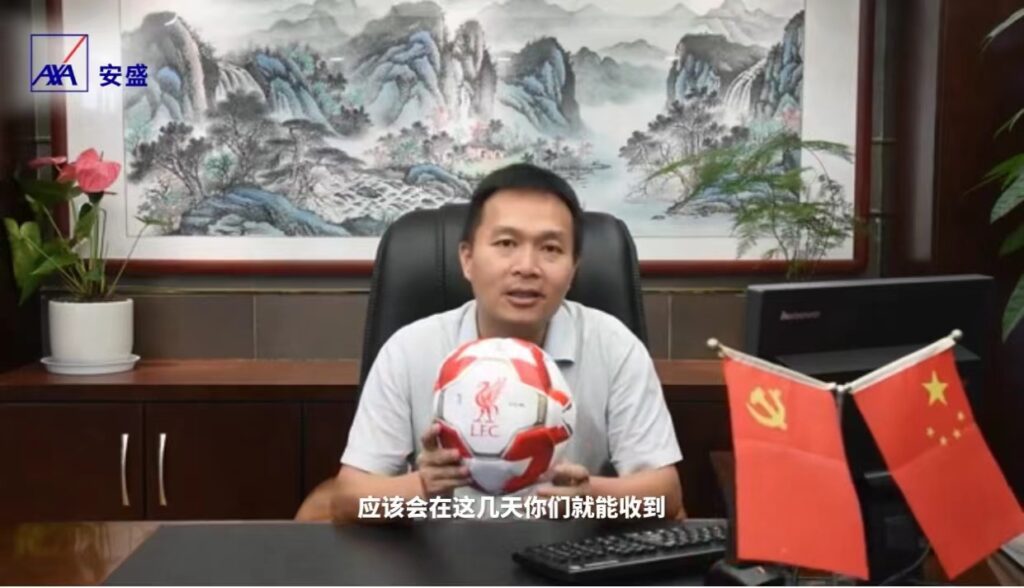安盛筑爱在行动 爱心守护困境儿童后续采访
AXA Heart in Action: caring for vulnerable children Follow-up Interview
上个月,“安盛筑城爱在行动”志愿者活动在全球范围内如火如荼地展开。公司发起微信捐赠步挑战赛后的一周之内,汇聚了包括员工在内的5163名爱心人士的参与以及突破3400万的爱心捐款步骤,所筹善款可以支持四川省凉山彝族自治州的贫困儿童一年内全部爱心健康包的采购费用,充分体现了安盛同仁以实际行动带动乡村振兴,支持贫困儿童的健康成长的公益初心。
随后, 7名安盛志愿者还赶赴四川省凉山彝族自治州爱佑儿童之家,对帮扶的困境儿童进行了爱心探访。作为志愿者代表,直销在线中心总经理曹红菊、广西分公司副总经理梁友仁与我们分享了参与这次爱心探访的感悟与体会。

1、梁总好,首先非常感谢您倾情参与凉山彝族自治州志愿者实地探访活动。我们了解到您来自少数民族,请您分享一下此次探访的心得体会,您对公益的看法和理解,是否有了变化?
梁友仁:
大家好,我是梁友仁,来自广西壮族自治区,我本人就是壮族。小时候就在相对严苛的生活环境以及父母的谆谆教诲中成长,因此我对凉山当地少数民族小朋友们的成长感同身受,生活在山区的他们面对那么多的困难,仍然对生活抱有积极和热忱,给我的内心深处很大的触动!

在此前,我和很多人一样,觉得公益仅仅是单向的“助人”。然而,在亲身投入这次公益活动之后,我彻底体会到公益活动不仅是“助人”,也是在“助己”。我也尽可能多得向小朋友们传递自身成长的经验——分享自律的重要性,以及自强不息的精神。
随着岁月的流逝,繁华过境,很多人也与“初心”渐行渐远。我们变得默然,不再珍惜,不再感恩。我想,这正是 “守护生命之本,践行人类进步”成为集团品牌使命的原因,它感召着全世界的安盛人,在全球各地践行这一伟大使命,为的是守护我们共同的家园,也为守护我们自己美好的未来。
我在这次实地探访的过程中,感受良多。
2、曹总好,您在这次实地爱心探访后,对公益的看法和理解,有怎样的变化呢?
曹红菊:
我非常赞同梁总的分享。我也一样,此前对公益的理解比较单一,停留在公益就是单纯帮助别人的层面;这次亲历活动的自己也有很多收获,我觉得的更大意义在于回馈社会,也对“赠人玫瑰,手有余香”这句话有了更加直观深刻的体悟。
在给中心内部兄弟机构的同事,以及朋友亲戚们分享这次公益活动的时候,得到的反馈都是“如果有下次,请一定把我带上!”
3、活动结束后,我们从项目组了解到当地的居民对衣物有极大的需求。两位都第一时间积极响应,在广西和成都两地积极组织员工捐衣捐物。曹总,能否请您向全公司的同事倡导一下,让更多的同事通过捐赠衣物,或者实地探访的方式,为这群困境中的孩子提供力所能及的帮助?
曹红菊:
活动结束后不久,我们从凉山彝族自治州的公益项目组那里得知,当地的民众还亟需衣物等生活用品。直销中心迅速响应,员工热情参与,在短时间内筹集到上千件衣物。
此外,中心也和当地项目组建立起良好的沟通渠道,未来我们还将持续关注当地的困境儿童,通过这个爱心平台践行爱与责任,努力弥合发展不均衡的现状。
我们也在员工亲友圈以及中心内部兄弟机构积极宣导,希望能够吸引到更多人关注这个弱势群体,已经得到了非常热烈的反响。我也借此机会呼吁所有安盛伙伴们都能尽己之力参与进来,“跬步积公益千里,滴水汇爱心长河”。
4、对于想要加入到这个公益项目中来进行实地探访,或者还在犹豫是否要加入进来的同事,两位有什么样的建议,或者是经验分享?以及,除了爱心健康包和衣物等物质援助之外,您觉得还有什么是安盛人可以提供帮助的?
曹红菊:
四川省凉山彝族自治州以老人和儿童群体为主,所以我们建议除了捐赠衣物,也可以尝试给孩子们分享一些书籍,比如课程相关的辅导书,课外扩展思维的科普书,甚至可以是一些有关农业种植、畜牧养殖类的书籍。(不一定非要是新书,可以是员工孩子们看过的书,写有笔记的可能更好,算是一种同龄人之间跨越时空的交流!)
我畅想,在不久的未来,可以尝试在项目所在地多组织一些员工团建活动,或者客户及合作伙伴的体验活动,深入当地去了解困境儿童及家庭的实际需求,帮助更多孩子有机会走出大山,了解更广阔的世界,让他们有能力更好地帮助家庭,照顾好爷爷奶奶。
梁友仁:
跟曹总团队一样,我们分公司同事也是上下一心,短时间内将饱含同事爱心的衣物寄到了项目所在地,希望能够尽我们所能,给这个困境中的群体他们所亟需的支持。
上个月实地探访的当天,我在跟孩子们深入交流以后得知,他们心里还偷偷埋藏着对足球的热爱。所以,分公司也在活动结束后为孩子们准备了他们心心念念的足球,希望他们能够坚持心中所爱,永不言弃。

和他们相比,我们要更加幸运、幸福。很多我们认为理所应当的生活便利,在他们看来是可望不可即的奢侈。如果有条件,希望大家都可以尽可能得帮助他们,哪怕是一只笔,一个本子,也可能成为他们珍藏很久的礼物。
1. First of all, a huge thank you to Mr. Liang for joining us in the Liangshan Yi Autonomous Prefecture volunteer event. Considering your background as a ethnic minority, would you like to share your experience in Liangshan and whether your thoughts regarding charity has changed?
Youren Liang:
I am an ethnic Zhuang Chinese from the Guangxi Zhuang Autonomous Region. I am moved by these kids as I can put myself in their shoes since I also grew in a relatively tough environment.
Like many others, I first thought that charity is simply about “helping other people” but this trip has given me a new perspective on charity, especially as I’ve witnessed the children’s passion and attitude towards life despite the challenges they face. Charity is also about “helping oneself.” I tried my best to tell the children about my personal experience growing up and the importance of self-discipline and resilience.
People tend to forget to be thankful for their life as they get older. This is why “Act for human progress by protecting what matters” is our brand motto. It reminds our colleagues around the globe to live by their words and safeguard our homeland and future. I learned a lot from this visit.
2. Mr. Cho, has your view on charity changed after your visit?
Hungju Cho:
I really resonate with what Mr. Leung shared. Like him, I used to have a relatively simplistic understanding of public welfare, thinking that it was simply about helping others. However, through this firsthand experience, I have gained a lot. In my opinion, the greater significance lies in giving back to society, and I now have a more intuitive and profound understanding of the Chinese proverb, “Giving a rose to others, leaving the fragrance in your hand,” which implies that doing good deeds for others not only benefits others, but also brings a sense of satisfaction and fulfillment to the person doing the good deeds.
3. We knew from our operations team that the Liangshan locals needed clothing and both of you quickly responded by organising donation campaigns with other colleagues in Guangxi and Chengdu. Mr. Cho, “Would you be able to advocate to our colleagues across the company and encourage more of them to provide assistance to underprivileged children through donating clothes or participating in on-site visits?”
Hungju Cho:
We responded quickly once we knew the local community was in need of clothing. I am proud of our colleagues for donating more than 1000 items of clothing in a short period of time. We shall continue our efforts and keep a close eye on the development of the rural areas. We will try our best to address inequality and spreading love.
We had also promoted the campaign via our social media channels and other corporate channels. More and more people are now aware of this, and I would like to encourage all AXA colleagues to join in together.
4. Do you have any tips for those considering to visit? Is there anything AXA colleagues besides providing material aid?
Hungju Cho:
The people in Liangshan are mostly elderly or children, so we would recommend donating textbooks, study guides for their courses or popular books on various topics. This can provide them with more knowledge and help broaden their horizons.”
In the future, I would like to organise more trips like this for AXA colleagues or other clients. We can do so much more to address the needs of families there, to expose the children to the outside world and enhance their capabilities for them to better contribute to their families.
Youren Liang:
Like Mr. Cho’s team, the members of my branch threw themselves in the campaign and donated many supplies within a limited time span. We hope to do everything we can to provide the support that these underprivileged groups urgently need.
On the day of the visit last month, I had a deep conversation with the children there and learned they actually loved football. Our branch also donated footballs to encourage the children to persist with their passion for the sport.
We are in far more fortunate positions than most of the children. The conveniences we take for granted may be a luxury to them. If we have the ability, we should help them out as much as we can as even small acts of service may have unexpected, long-lasting impact.